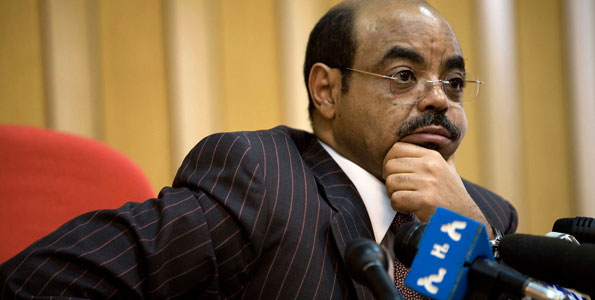
Ethiopian Prime Minister Meles Zenawi. Photo/FILE

By EMEKA-MAYAKA GEKARA, NATION Writer
Wednesday, March 24, 2010
In reports released in Nairobi on Wednesday clearly timed to send a statement ahead of the polls, Human Rights Watch accused the two governments of gross violation of human rights.
The agency said studies conducted between November 2009 to March 2010 in Sudan found that both the Government of National Unity and the Government of South Sudan have been restricting freedoms critical to a fair poll, including freedoms of expression, assembly press, and equal access to the media.
“Conditions in Sudan are not yet conducive for a free, fair, and credible election,” said Georgette Gagnon, Africa director at Human Rights Watch. “Unless there is a dramatic improvement in the situation it is unlikely that the Sudanese people will be able to vote freely for leaders of their choice.”
On its part, Ethiopian government was accused of waging sustained attack on political opponents, journalists and rights activists.
The agency says the ruling Ethiopian People’s Revolutionary Democratic has been suppressing opposition supporters by withholding services such as agricultural inputs, loans and job opportunities. The government has also enacted laws that gag the media.
“Expressing dissent is very dangerous in Ethiopia,” said Gagnon.
But the Ethiopian embassy in Nairobi denied the claims and accused the agency of being used to discredit the polls.
Mr Yelibu Lijalem, the media man at the embassy said the agency released a similar report two weeks before the 2005 elections. “The reports are being written deliberately to blackmail and tarnish Ethiopia’s human rights record.”
Ethiopian government of Melese Zenawi is holding parliamentary elections on May 23.
And, across the border, Sudan is scheduled to hold a general election in both north and south from April 11 to 18. The election is a milestone in the implementation of the 2005 Comprehensive Peace Agreement that brought an end to Sudan’s civil war.
But the watchdog declared that President Omar-Al-Bashir was unfit to run for re-election because the International Criminal Court wants him arrested over war crimes committed in Darfur.
“He is a fugitive from justice,” Gagnon said. “He should be in The Hague answering to charges of heinous crimes.”
In the north, the authorities have been accused of detaining opposition supporters and breaking up gatherings.
The watchdog claimed that in one incident on March 14, two armed men arrested Abdallah Badawi, an activist with the group Girfina (“We Are Fed Up”) in Khartoum and severely assaulted him.